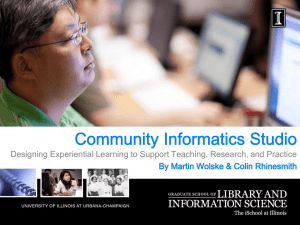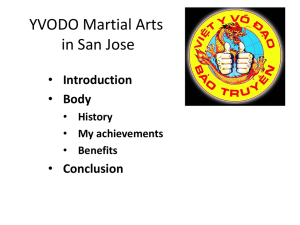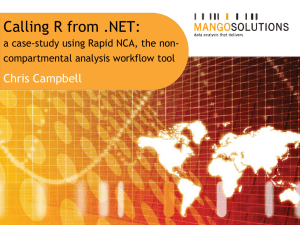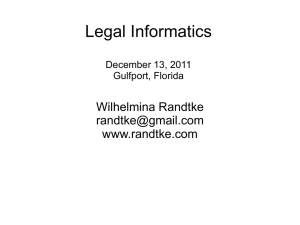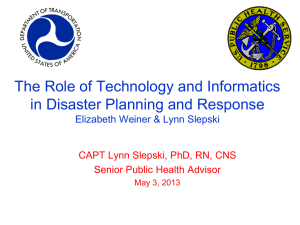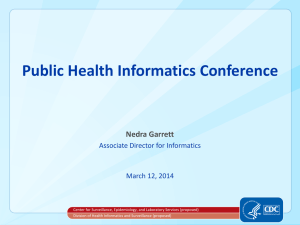Wolske-cistudio_ala13 - 2013 ALA Annual Conference
advertisement
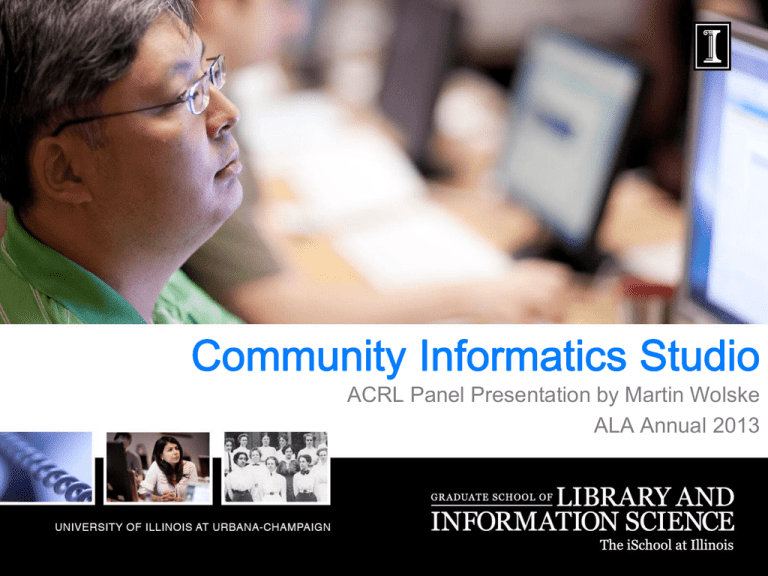
ACRL Panel Presentation by Martin Wolske ALA Annual 2013 A 13-YEAR JOURNEY FROM SERVICE-LEARNING TO COMMUNITY INQUIRY 2 “We must rapidly begin the shift from a "thing-oriented" society to a "person-oriented" society. When machines and computers, profit motives and property rights are considered more important than people, the giant triplets of racism, materialism, and militarism are incapable of being conquered.” Martin Luther King, Jr. "Beyond Vietnam” address, given at New York City’s Riverside Church on April 4, 1967 3 • Technology drives the development of its social structure and cultural values – Classical: the efficiencies inherent in technology lead towards natural selection of social processes that integrate the technology – Cyberlibertarianism emphasize: • ICT as inevitable, irresistible, & world-transforming • Individualism, ecstatic self-fulfillment, & rational self-interest • Supply-side, free-market capitalism Sources: – – Jacques Ellul (1954) The Technological Society Langdon Winner (1997) “Cyberlibertarian Myths and the Prospects for Community”, Computers and Society 4 • Considers how social, institutional, economic, and cultural factors impact: – The direction and rate of innovation – The form of technology and technological practices – The outcomes of technological change for different groups in society Source: Williams, R, & Edge, D. (1996). The social shaping of technology. • Example – Safiya Noble (2012) –“Missed Connections: What Search Engines Say About Women” 5 Source: Bishop, Bruce, & Jeong, 2009 6 THE COMMUNITY INFORMATICS STUDIO 7 • “Using technology to support community development goals” (Stoecker, 2004) • “A sustainable approach to community enrichment that integrates participatory design of information technology resources, popular education, and assetbased development to enhance citizen empowerment and quality of life.” (Campbell & Eubanks, 2004) 8 • Learning to be a professional using master/apprentice model (Lackney, 1999) • Students’ “purposes” + current environment + teacher as guide = current learning (Dewey, 1938) • Iterative design process through desk critiques • Working within studio space provides important modeling of professional practice • Integral pedagogy in architecture and fine and applied arts. 9 Source: Wolske, Rhinesmith, and Kumar (in review) 10 Public Computing Center Design Resources Activities Outputs Short-term Outcomes Mid-term Outcomes Tech Volunteers Provide assistance, instruc on Librarians Available technology EDD Grant Redesign of computer lab Increased economic output 165 ques ons answered daily, on average Support for running a business Job applica ons submi ed Patrons find and create informa on Tech workshops, community ambassador’s contribu ons Improved quality of both independent and collabora ve work Long-term outcomes 320 computer logins daily, on average Number of workshops offered on new topics Over 100 surveys completed, 4 focus groups run Homework completed New skills are acquired, Library increases role as “3rd place” Increased sense of ownership of computer lab and comfort while working there Local businesses are more produc ve Patrons acquire jobs Patrons increase level of educa on Patrons are involved in community in new ways, both in-person and online Lab users feel a sense of empowerment through increased knowledge and new connec ons with those around them, resul ng in a more informed and par cipatory community 11 The Whip Hair Design Source: http://www.prairienet.org/sites/whip 12 I believe that to fully capitalize on studio-based learning to advance LIS-led Community Engagement, the following Community Informatics values are key: • • • • • • Sustainable Approach to Community Enrichment Asset-Based Perspective Popular Education & Participatory Design Difference is a Resource Teach, Research, & Practice with Community Building Healthy Communities Informed especially by Stoecker (2012); Eubanks (2011); Friere (1970/1993); Dewey (1938) 13 How can the Community Informatics Studio can be understood as a model of experiential learning to support LIS teaching, research and practice? • Studio pedagogy resonates strongly with students because it is rooted in experiential learning • Studio pedagogy invites students into research on current topics in LIS through the design problem • Studio pedagogy can foster social justice education & challenge technological determinism 14 Resources & References Student projects are documented at: http://www.prairienet.org/engagement http://www.prairienet.org/op/ Bishop, A., Bruce, C., & Jeong, S. (2009). Beyond service learning. In (Eds.) Service learning: Linking library education and practice. Chicago, IL: American Library Association. Campbell, N. D. & Eubanks, V. (2004). Community informatics as a pathway to social change. Retrieved from http://www.brillomag.net/COPC/CI/ Dewey, J. (1938). Experience and education. New York, NY: The Macmillan company. Eubanks, V. (2011). Digital dead end: Fighting for social justice in the information age. Cambridge, MA: The MIT Press. Elull, J. (1967). The Technological Society. Vintage Books. Freire, P. (1970/1993). Pedagogy of the oppressed. New York, NY: Continuum. King, M.L. (1967) Beyond Vietnam: A Time To Break The Silence. Speech delivered at New York's Riverside Church on April 4, 1967. Transcript retrieved from http://www.informationclearinghouse.info/article2564.htm 15 Lackney, J. A. (1999). A history of the studio-based learning model. Retrieved from http://www.edi.msstate.edu/work/pdf/history_studio_based_learning.pdf Noble, S. (2012). Missed Connections: What Search Engines Say About Women. Bitch Magazine, 54. Retrieved from http://bitchmagazine.org/issue/54 Stoecker, R. (2012). Research Methods for Community Change 2nd ed. Sage Publications. Stoecker, R. (2005). Is community informatics good for community? Journal of Community Informatics, 1(3). Retrieved from http://www.cijournal.net/index.php/ciej/article/view/183/129 Williams, R, & Edge, D. (1996). The social shaping of technology. Research Policy 25. Winner, L. (1997). Cyberlibertarian myths and the prospects for community. Computers and Society, 27(3). Retrieved from http://delivery.acm.org/10.1145/280000/270864/p14-winner.pdf Wolske, M.(2012). A 12 year journey from traditional service learning to community inquiry, Proceedings of the CIRN 2012 Community Informatics Conference: ‘Ideals Meet Reality’. Retrieved from https://www.ideals.illinois.edu/handle/2142/35070 Wolske, M., Rhinesmith, C., & Kumar, B. (in review). Community Informatics Studio: Designing Experiential Learning to Support Teaching, Research, and Practice. Journal of Education in Library and Information Science. 16
